6. Bob & Carol & Ted & Alice (1969)
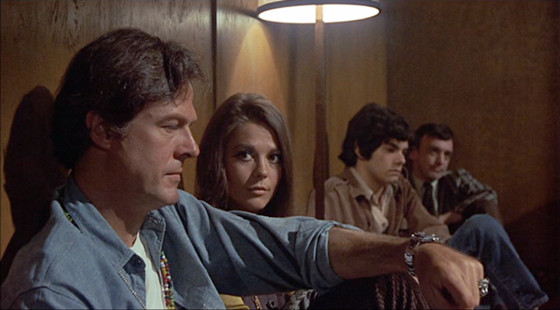
This past decade has seen plenty of protests for multiple causes around the world; these movements certainly evoke memories of similar demonstrations that took place over the 1960’s. The sixties is seen as the era of counterculture that saw social tensions mount throughout the generational lines of multiple issues, these include civil rights, women’s equality and human sexuality. The latter was the subject of Paul Mazursky’s 1969 classic Bob & Carol & Ted & Alice. But to simply label this film, as a run-of-the-mill sex comedy would be doing it a huge injustice, for it is also a hilarious takedown of so-called ‘champagne socialists’ and how they fit within the protest generation. Making it an ingenious satire of bourgeois sensibilities in a progressively sexually liberated world.
The films sees Bob and Carol, played by Natalie Wood and Robert Culp, who are two Los Angeles sophisticates who were stuck in a troubling marriage only for it to fixed after take part of a group therapy retreat that teaches them to embrace complete openness. The couple soon shares their new lifestyle with their more conservative minded friends Ted and Alice, played wonderfully by Elliot Gould and Dyan Cannon, who are extremely uncomfortable by Bob and Carol’s new ‘enlightened’ lifestyle.
Throughout the film, the growing sexual tension between the four of them is made more and more apparent until it ultimately builds into an excruciatingly awkward foursome. While the four main characters are in no way outright dislikeable, they are undoubtedly caricatures of wealthy west-coast bohemians who use their lofty social positions to piggyback on the sexual revolution sweeping across America. But instead of diving head first into the movement, they attempt to intellectualize it as well as hiding behind the excuse of polyamory as a way of using sex to fill voids of emotional fulfillment in their lives. Despite dealing with difficult themes, Bob & Carol & Ted & Alice remains an utterly hilarious film with great moments of farce and an overabundance of witty repartee.
7. The Ruling Class (1972)
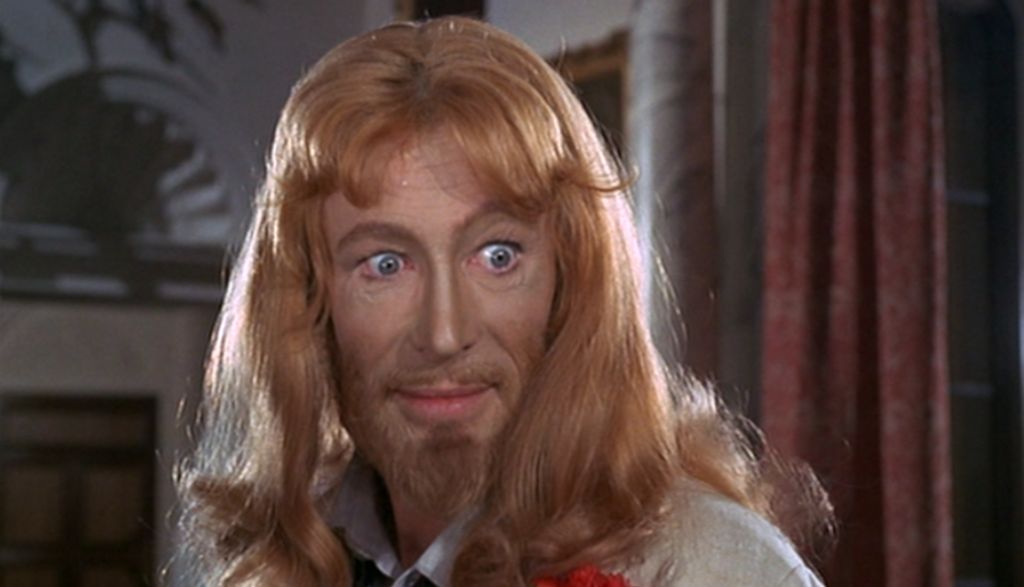
Maybe I speak with a more than a little bias when I write this, but I find it difficult to name any other country that has produced such an incredible amount of dark comedies than Great Britain. From the iconic Ealing comedies, such as Kind Hearts and Coronets and The Ladykillers, to more recent films from this century like Four Lions and The Death of Stalin. There is just something deeply entwined within British society that makes us more receptive and appreciative to finding humour in taboo subjects than anywhere else in the world. Black comedy is often darkest when mixed with satire as it acts as a twisted coping mechanism to help the population through hard times. A common target of this is the aristocracy, and I can’t think of any better film that exemplifies this better than Peter Medak’s The Ruling Class.
The Ruling Class tells the story of Jack Gurney, a paranoid schizophrenic noble man, played by Peter O’Toole in what is surely the funniest performance of his entire acclaimed career, who inherits a peerage after the previous Earl dies from auto-erotic asphyxiation. Dark enough for you yet? The problem with Jack is that he believes he’s Jesus Christ, and all his talk of love and charity does not agree to the unscrupulous values of the rest of his family who quickly seek to cure him of his peaceful views, leading to disastrous results not only for themselves but the whole of British society.
The Ruling Class is as hilarious as it is relentlessly vicious in its subject matter, somewhat blending the morality tales of Shakespeare with the exaggerated farce of Oscar Wilde. What makes the film so funny as it is frightening, after being ruled by an increasingly conservative government for the past ten years and counting, it’s getting easier to find the similarities with every passing day. The film has unfortunately become somewhat of a forgotten classic over the years, so do yourselves a favour and watch this bonafide masterpiece of British comedy.
8. The Discreet Charm of the Bourgeoisie (1972)
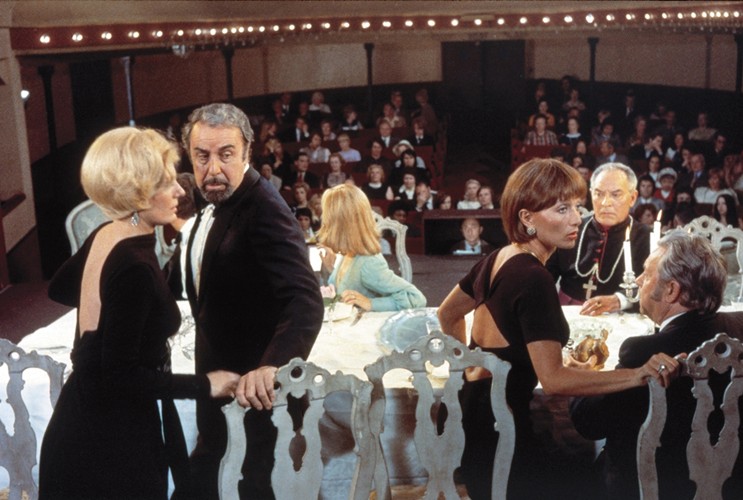
When it comes to the specific area of satire that is the bourgeois society, no filmmaker has better shown the mental and moral effects of the ‘nouveau riche’ than the legendary Luis Buñuel. The Spanish auteur built his entire legacy on his inimitable technique of directing; using cinematography, set design and sound as a way to highlight various surreal visuals in a way no other director has done before or since. While the bourgeoisie was a recurring theme in many of his films, from his early work in L’Age d’Or to his very last film That Obscure Object of Desire. But no film of his has better or more famously satirized this subject matter better than his 1972 tour de force, The Discreet Charm of the Bourgeoisie.
The film’s plot is quite a difficult one to describe to anyone who has not seen it. Basically, the film follows a group of bourgeois friends as they bounce from several thematically linked scenes, each one more absurd than the last. The characters expect an evening of fine dining only to be confronted my multiple surreal scenes that include being unwittingly cast as actors in a play in front of a packed audience, a soldier who is sent by the ghost of his dead mother on a mission of vengeance to a recurring storyline involving a Latin American terrorist organization.
Buñuel uses multiple genres and cynical humour to play tricks on his characters who are growing increasingly outraged by the nonsensical/nightmarish situations they find themselves in. To me at least, this is easily Buñuel’s funniest film as he clearly takes relish in wreaking havoc over his characters, which are portrayed as empty hypocrites that each show shallow interests in sex, money and social etiquette all while the walls of logic come crashing down around them. What is particularly apparent in the film is that despite the guests going from one dinner party after another, the food remains uneaten. Why? Perhaps Buñuel is implying that despite the luxury that comes with part of the bourgeois lifestyle, they will always be starving and forever searching for fulfilment.
9. O Lucky Man! (1973)
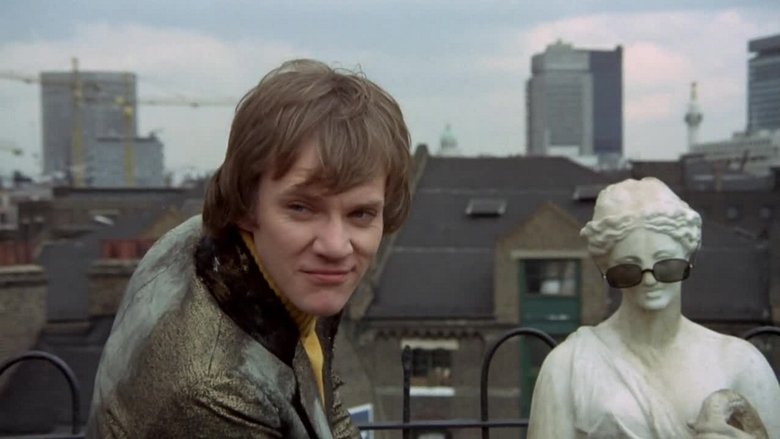
One of the most highly revered director/actor relationships, certainly in British cinema history, is Lindsay Anderson and Malcolm McDowell. Together they are responsible for the Mick Travis trilogy, in which McDowell plays the titular Travis who, in no uncertain terms, is the ultimate everyman. His first appearance in film was in the counterculture classic ‘if…’ which was a savage takedown of public schooling which famously culminated in an armed insurrection. The third film was Britannica Hospital, which took a surreal look at the hypocrisies and malpractices in the British health care system. However, it the second film in this satirical sandwich that I find the most interesting, and that is 1973’s O Lucky Man!
The film is loosely based on McDowell’s experience working as a coffee salesman, in that it sees Travis take up that particular profession. However, the similarities between the actor and the character ends there as we see Travis become a picaresque figure as he travels across England, in the process becoming involved in experiments in human-animal genetics, arms-sales to an African dictator and ultimately ends with his emergence as a film star discovered by none other than Anderson himself.
The movie is by no means an easy watch, what three-hour film is? But O Lucky Man is certainly a more than deserving watch. Seeing McDowell in this period is yet another reminder of why he is seen as a national treasure, along with other performances from a supporting cast consisting of British acting royalty; including Ralph Richardson, Rachel Roberts, Helen Mirren and Arthur Lowe.
O Lucky Man is ultimately as satire of living in a modern world corrupted by sadistic greed as we watch Mick Travis go from naïve optimism to gradually losing his innocence, as he becomes a pawn to the idea of free enterprise. With the growing mistrust of the promise of prosperity that comes with living in a capitalist society, the time has never been more ripe for this film to be rediscovered and for more budding cinephiles to undertake the surreal odyssey that is O Lucky Man!
10. Parasite (2019)
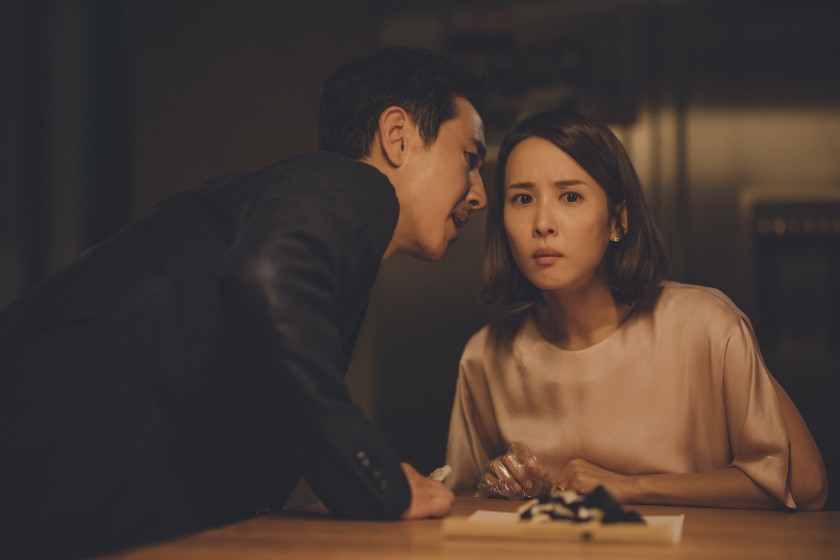
Despite having only been released just last year, Bong-Joon Ho’s Parasite has already gained a legendary reputation. After being awarded four Academy Awards including Best Picture, an astonishing achievement for a film not in the English language, it has been widely hailed as not only a modern masterpiece but a film that surely take its rightful place among the pantheon of pictures that are considered the best of all time. The film is simultaneously a gut-busting black comedy and nail-biting thriller, but what makes the film so special is its use of satire, particularly within South Korean society but can also be attributed to the class divisions in every country around the world.
Parasite tells the story of the Kims, a poor family living in a small semi-basement apartment who make ends meet with multiple low-paying jobs that include folding pizza boxes. The family’s son Ki-woo is presented the opportunity of working as a tutor to the much more prosperous Park family’s teenage daughter.
After becoming ingratiated with the wealthy family, Ki-woo sees a chance to bring the rest of his family into the Park’s employ, even if it is through nefarious means as they sabotage the previous employees out of their positions and manipulate the family to benefit themselves. However, this leads to one of the finest plot twists in cinema history as it is revealed that the Park’s mansion harbors a horrifying secret. Soon the audience comes to realize that despite the Kims relying on devious, under-handed tactics to get to get themselves into a position of somewhat prominence, given their harsh reality as being members of South Korea’s lowest class it is difficult to dispute the fact that if we were in their position, we would have done the exact same thing.
The film builds to a shocking finale that explodes into a chaotic scene where the Park’s reveal the true extent of their elitist attitudes, leaving the Kims to realize that no matter how hard they try to climb up the social ladder, escape from their poverty-stricken surrounding is impossible and will continue to be seen as nothing more than peasants to those in the bourgeoisie.